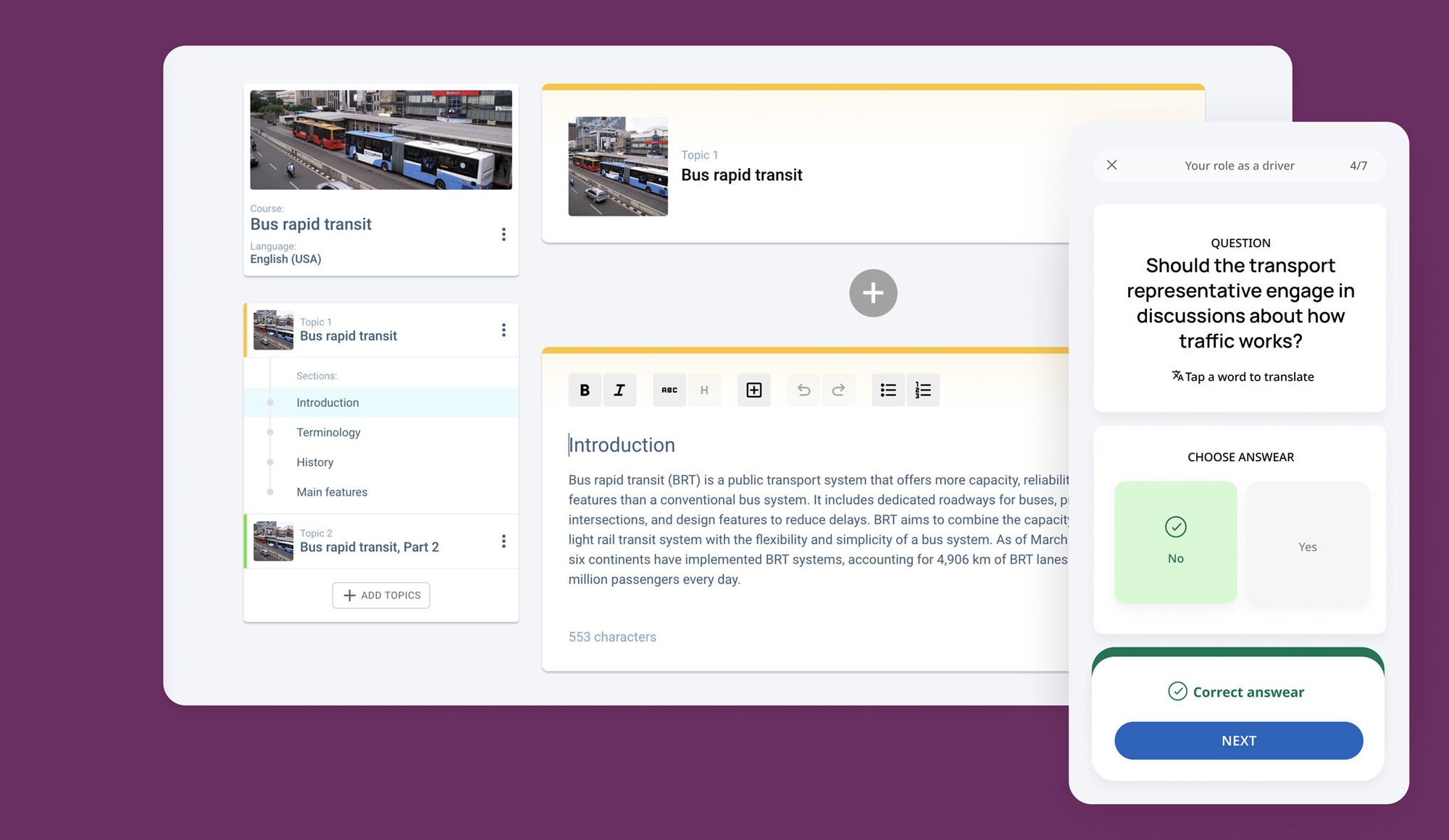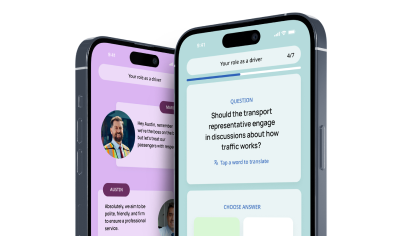An enterprise Learning Management System (LMS) is a powerful tool that helps organisations streamline and enhance their training and learning processes. It provides a centralised platform for managing, delivering, and tracking various types of educational content. In this guide, we will explore the benefits of using an Enterprise LMS, key features to look for, tips on choosing the right system, best practices for implementation, and future trends in the industry.
Overview of enterprise learning management systems (LMS)
Enterprise Learning Management Systems (LMS) are software platforms facilitating training programs' administration, documentation, tracking, and reporting. They serve as a central hub, allowing organisations to deliver learning materials, track learners' progress, and assess their performance. Whether it's employee onboarding, compliance training, or skills development, an enterprise LMS can efficiently handle all organisational learning initiatives.
One key feature of enterprise LMS is the ability to create personalised learning paths for individuals or groups based on their roles, skills, and learning objectives. This tailored approach ensures learners receive relevant and targeted training, improving engagement and knowledge retention. Additionally, enterprise LMS often have interactive features such as quizzes, assessments, and discussion forums to enhance the learning experience and encourage collaboration among learners.
Furthermore, enterprise LMS offer robust reporting and analytics capabilities, allowing administrators to track the effectiveness of training programs, identify areas for improvement, and make data-driven decisions. These insights enable organisations to continuously enhance their learning initiatives and ensure that they align with business goals and objectives. In addition, some enterprise LMS integrate with other HR systems, such as performance management and talent development platforms, to provide a seamless learning experience for employees across the organisation.
Benefits of using an enterprise LMS
1. Scalability and flexibility
An enterprise LMS allows organisations to scale their training efforts without limitations. As your workforce grows, the system can accommodate increasing learners and courses. Additionally, it offers flexibility in terms of content delivery. Whether you prefer instructor-led training, eLearning modules, or both, an enterprise LMS can support various training methods.
2. Centralised training and learning management
Companies can consolidate their training materials in one central location using an enterprise LMS. This eliminates the need for multiple learning platforms and ensures a unified learning experience for all employees. Administrators and learners can access courses, assessments, and other learning resources from a single interface.
3. Improved compliance and tracking
Compliance training is crucial for many organisations, especially in regulated industries. An enterprise LMS simplifies compliance management by providing tools to create, distribute, and track compliance courses. It generates reports and documentation that can be used to demonstrate regulatory compliance during audits.
4. Enhanced employee engagement and performance
An enterprise LMS offers interactive and engaging learning experiences that captivate employees' attention. It allows multimedia content integration, gamification elements, and social learning features, boosting learner engagement and motivation. By providing access to ongoing training and development opportunities, organisations can foster a culture of continuous learning and improve employee performance.
Key features of an enterprise LMS
1. User management
An effective enterprise LMS should provide robust user management capabilities. It should allow administrators to create, edit, and organise user profiles, assign roles and permissions, and manage user groups. User management features enable streamlined communication with learners, ensuring they receive relevant notifications and updates.
2. Content management for learning management system
Content management is a critical feature of an enterprise LMS. It includes tools for creating, importing, organising, and updating learning materials. An enterprise LMS should support multiple content formats, such as presentations, videos, documents, and interactive modules. It should also offer version control and collaboration features for content authors.
3. Management for online courses
An enterprise LMS should provide comprehensive course management functionalities. This includes creating course catalogues, defining enrollment criteria, managing prerequisites, and scheduling classes. It should also support blended learning approaches, combining online and offline training methods.
4. Assessment and certification for online courses
An enterprise LMS should enable the creation and delivery of assessments to evaluate learners' knowledge and skills. It should offer a variety of question types, automated grading, and feedback capabilities. Additionally, it should provide options for issuing certifications upon completing online courses or assessments.
5. Analytics and reporting for training management system
Analytics and reporting features are essential for monitoring learners' progress and assessing the effectiveness of training initiatives. An enterprise LMS should provide real-time dashboards, customisable reports, and data visualisation tools. This enables administrators to track completion rates and performance metrics and identify areas for improvement.
6. Integration capabilities for the learning management system
An enterprise learning management system should have integration capabilities with other enterprise systems, such as HRIS, CRM, or SSO solutions. Integration enables seamless data exchange, eliminates manual data entry, and enhances the user experience.
7. Gamification
Gamification can increase learner engagement and motivation. An enterprise learning management system can transform the training experience into an exciting and interactive journey by incorporating game-like elements, such as badges, leaderboards, and rewards. Learners can earn points, compete with their peers, and unlock achievements, making learning more enjoyable and encouraging healthy competition.
8. Social learning capabilities
In addition to gamification, an enterprise LMS should provide social learning capabilities. Social learning allows learners to connect and collaborate with their peers, fostering a sense of community and facilitating knowledge sharing. Features such as discussion forums, chat rooms, and collaborative projects enable learners to engage in meaningful conversations, ask questions, and learn from each other's experiences. This social aspect of learning enhances knowledge retention and promotes teamwork and collaboration, essential skills in today's workplace.
Choosing the right enterprise learning management system
1. Assessing organisational needs
Before selecting an enterprise learning management system, it is essential to evaluate your organisation's specific requirements. Consider factors such as the size of your workforce, the types of training programs you offer, and the desired level of customisation. Identifying your needs will help you narrow your options and choose a system that aligns with your goals.
Furthermore, involving key stakeholders from different departments in the assessment process is crucial. By gathering input from various teams, you can ensure that the chosen enterprise learning management system meets your organisation's diverse needs. Additionally, conducting surveys or focus groups with employees can provide valuable insights into their preferences and expectations regarding the learning platform.
2. Evaluating learning management system vendors
When evaluating LMS vendors, consider their track record, customer references, and the range of features they offer. Pay attention to user reviews and testimonials to gauge customer satisfaction. It's also crucial to assess the vendor's customer support and training resources to ensure ongoing assistance when needed.
In addition to the vendor's reputation and feature set, consider their roadmap for future developments. A vendor that regularly updates and improves their LMS is committed to innovation and staying abreast of industry trends. This can be critical in ensuring your chosen enterprise LMS remains relevant and effective long-term.
3. Implementation considerations
Ensure your organisation has the infrastructure and technical expertise to implement and maintain the chosen enterprise learning platform. Consider factors such as deployment options (cloud-based or on-premises), system compatibility, and integration requirements. Develop an implementation plan and allocate resources accordingly to ensure a smooth transition.
4. Testing and training
Piloting the system with a small group of employees can help identify potential issues or improvement areas before scaling up. Providing comprehensive training sessions for administrators and end-users will also contribute to successfully implementing and adopting the new learning platform.
Best practices for enterprise LMS implementation
Implementing an enterprise learning management system successfully requires careful planning and execution. Here are some best practices to consider:
- Clearly define your goals and objectives for implementing an enterprise learning platform.
- Involve key stakeholders from different departments to ensure their buy-in and support.
- Create a comprehensive training plan for administrators and end-users to maximise system adoption.
- Perform thorough testing and quality assurance to identify and fix any issues before launch.
- Communicate the benefits and potential impact of the new system to employees and provide ongoing support and assistance.
When defining your goals and objectives for implementing an enterprise learning management system, it is crucial to consider your organisation's specific needs and requirements. This could involve conducting a thorough needs analysis to determine what features and functionalities are essential for your LMS to be successful.
Furthermore, involving key stakeholders from different departments ensures their buy-in and support and brings diverse perspectives. This collaborative approach can lead to a more holistic implementation strategy considering the varied needs of different user groups within the organisation.
Future trends in enterprise learning platforms
As technology evolves, enterprise LMSs are expected to see several trends shaping their future. Some of the significant trends include:
- Mobile learning: With the rise of mobile devices, enterprise LMSs are increasingly being optimised for mobile learning experiences.
- Personalisation: Advanced analytics and AI-based algorithms enable personalised learning paths and recommendations tailored to each learner's needs.
- Microlearning: Bite-sized learning modules and just-in-time training are gaining popularity, allowing learners to access targeted knowledge quickly whenever needed.
- Virtual and augmented reality: VR and AR technologies have the potential to revolutionise immersive and interactive training experiences.
- Social learning features: Integrating social learning features within your enterprise learning management system is becoming a growing trend. This allows learners to collaborate, share knowledge, and engage in discussions within the learning environment. This fosters a sense of community and enhances the overall learning experience.
- Adaptive learning: Adaptive learning is where the platform dynamically adjusts the content and difficulty level based on the learner's progress and performance. This personalised approach ensures that each learner receives a tailored learning experience optimised for their learning pace and style.
Discover the Lingio effect in learning management
Ready to transform your organisation's learning experience into an engaging, effective, and enjoyable journey? At Lingio, we harness the power of artificial intelligence, gamification, and expert coaching to create a unique learning environment that drives impressive results.
Our employee training platform goes beyond traditional learning methods. Join the ranks of satisfied customers who have seen the impact of fun, AI-powered learning on their staff. Take advantage of the opportunity to elevate your training programs. Book a demo today and see how Lingio can make learning a delightful adventure for your team.
FAQs
1. Can an enterprise learning platform be customised to match our organisation's branding?
Yes, most enterprise learning platforms allow you to customise branding elements, such as logos, colours, and themes, to reflect your organisation's identity.
2. How can an enterprise LMS help improve employee engagement?
An enterprise learning platform offers interactive and engaging learning experiences, gamification elements, and social learning features that enhance employee engagement and motivation.
3. Can an enterprise LMS be integrated with our existing HR or CRM systems?
Yes, many enterprise learning platforms offer integration capabilities with other enterprise systems, allowing seamless data exchange and automation.
4. How can an enterprise learning management systems help track compliance training?
An enterprise LMS provides tools to create, distribute, track, and report on compliance courses, ensuring that regulatory requirements are met and documented.
5. Can an enterprise LMS handle multiple types of learning content?
An enterprise LMS can support various content formats, including presentations, videos, documents, interactive modules, and assessments.


Table of contents
Intro
Overview of enterprise learning management systems (LMS)
Benefits of using an enterprise LMS
Key features of an enterprise LMS
Choosing the right enterprise learning management system
Best practices for enterprise LMS implementation
Future trends in enterprise learning platform
Discover the Lingio wow effect in learning management
FAQs

